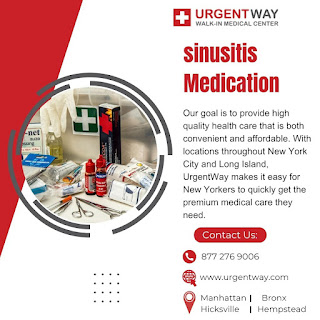How does chronic sinus infection treatment vary for individuals with underlying conditions like asthma or diabetes?
How does chronic sinus infectiontreatment vary for individuals with underlying conditions like asthma or diabetes?
Introduction:Prolonged sinus
inflammation is the hallmark of chronic sinus infections, sometimes referred to
as chronic sinusitis, a persistent and frequently incapacitating illness. The
symptoms of this illness, which include headaches, facial pain or pressure,
nasal congestion, and a diminished sense of smell, can have a serious negative
influence on quality of life. While there are established general treatment
methods for chronic sinus infections, the approach for patients with underlying
medical disorders such as diabetes or asthma can differ dramatically. These
coexisting illnesses can make it more difficult to treat chronic sinusitis,
requiring specialized treatment plans that take care of the sinus infection as
well as the underlying medical problems.
Comprehending
Prolonged Sinusitis:
The term "chronic sinusitis" refers to sinus inflammation that, in
spite of treatment, persists for longer than 12 weeks. Numerous things,
including as allergies, nasal polyps, a deviated septum, bacterial, fungal, or
viral infections, might induce the illness. Typical standard therapies consist
of:
·
Nasal corticosteroids: To lessen nasal passageway edema and
irritation.
·
Use saline nasal irrigation to clear allergies
and mucous.
·
When a bacterial infection is suspected, use
antibiotics.
·
Antifungal therapies: For infections caused by fungi.
·
Surgery:
To clear blockages or fix structural problems.
However, the
terrain of treatment gets more complicated when diabetes or asthma interact
with chronic sinusitis.
Forever Sinusitis and Allergies:
Chronic asthma is a respiratory disease marked by inflammation of the airways,
which can cause wheezing, shortness of breath, tightness in the chest, and
coughing fits. Asthma and chronic sinusitis are known to be associated; this is
known as the "united airway disease" idea. According to this
hypothesis, the upper and lower airways constitute one continuous respiratory
tract, and inflammation in one might influence the other (e.g., the lungs) and
vice versa.
Treatment Ideas for People with Asthma Using an Integrated Care Approach: It's
critical to treat chronic sinusitis and asthma at the same time.
Medication
Management: Patients with
asthma may already be using other asthma drugs or inhaled corticosteroids on a
regular basis. It is important to use caution when adding nasal corticosteroids
for sinusitis to prevent overexposure, which can have systemic side effects.
Biologics: In more severe cases, biologic medicines (such as mepolizumab,
an IL-5 inhibitor) that target particular pathways in the inflammatory process
may be helpful. By lowering general inflammation, these therapies can help
manage the symptoms of both chronic sinusitis and asthma.
Handling Allergies: Common causes of sinusitis and asthma are allergies.
Testing for allergies and the treatment that follows, such as immunotherapy or
antihistamines, can help lessen the frequency and intensity of symptoms.
Avoiding Triggers: It's critical to recognize and stay away from
environmental triggers including smoke, dust mites, and pollen. Making use of
air purifiers
Both
Diabetes and Prolonged Sinusitis:
Diabetes, which is typified by high blood sugar, can weaken the immune system
and make people more vulnerable to infections, such as persistent sinusitis.
Diabetes that is not properly managed might potentially result in issues that
make sinusitis treatment more difficult.
Diabetes Patients' Treatment Options: Glycemic Control It's critical to
effectively control blood sugar levels. Elevated blood sugar levels can hinder
the immune system's reaction and hinder the healing process. To get the most
out of their diabetes treatment plan, patients should collaborate closely with
their healthcare physician.
Risk of Infection: Individuals with diabetes have an increased chance of
getting infections, and they may need antibiotics more frequently. Antibiotic
selection, however, needs to be done with caution, taking into account possible
effects on blood sugar levels and combinations with diabetic drugs.
Antifungal Treatments: Fungal infections, particularly those affecting
the sinuses, are more common in diabetics. Antifungal therapies might be
required, and the patient's general health and diabetes control should be taken
into account while selecting a medicine.
Nutrition and Hydration: Sustaining appropriate nutrition and hydration
is essential for immune system performance and recuperation. Patients with
diabetes should eat a balanced diet that promotes both blood sugar control and
overall health.
Frequent follow-ups are necessary to look for any indications of infection or
problems in diabetic patients with chronic sinusitis. Frequent imaging studies
to evaluate sinus health and blood sugar levels can aid in early problem identification
and timely treatment.
Steer clear of nasal decongestants: Certain over-the-counter
decongestants can increase blood pressure.
Sinus Infection Doctor At UrgentWay Walk-In
Clinic:
Sinus infection treatment is available at all
UrgentWay locations. We are open seven days a week from morning to evening,
giving you the freedom to visit us whenever it is convenient. Our experienced
providers will assess your condition, advise the best sinus infection treatment
accordingly and counsel you on preventative care.
Conclusion:
When treating chronic sinus infections in people with underlying medical
disorders such as diabetes or asthma, a complete and sophisticated strategy is
needed. Healthcare professionals can create efficient treatment regimens that
treat the sinusitis as well as the underlying diseases by taking into account
the particular demands and challenges of these individuals. Effective
management relies heavily on patient education, individualized treatment plans,
and coordination amongst various specializations. The prognosis is improving
for people with chronic sinusitis and concomitant diseases thanks to continuous
research and breakthroughs in medical care.
.png)



Comments
Post a Comment